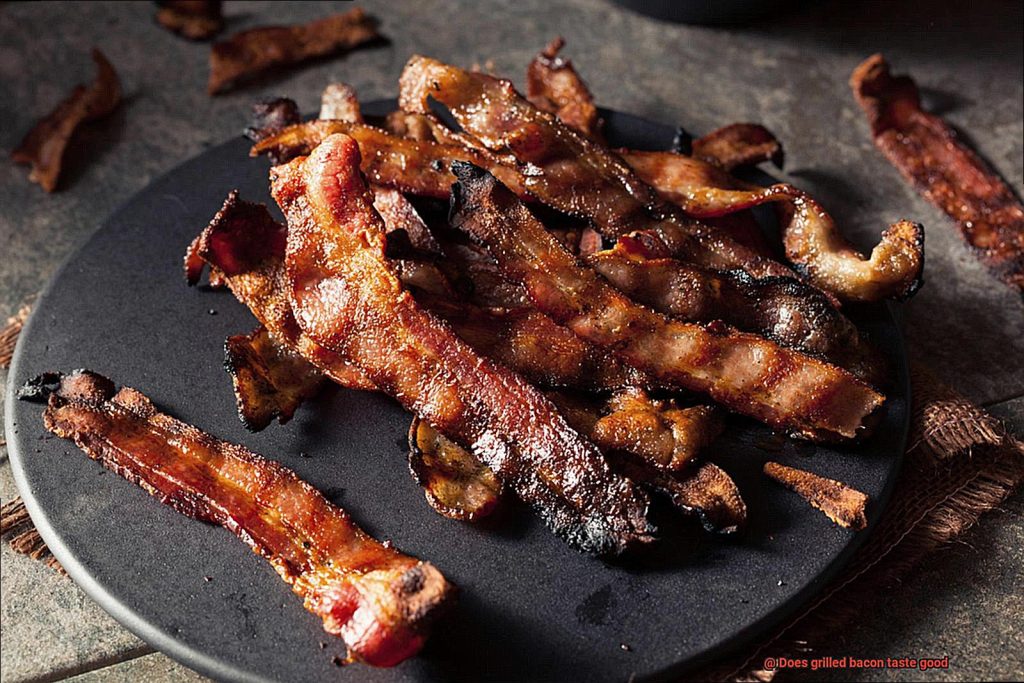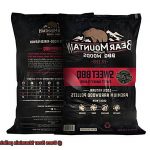Imagine waking up to the mouthwatering aroma of bacon sizzling on the grill. The sun is just starting to peek over the horizon, and you can’t wait to sink your teeth into that crispy, savory goodness. But have you ever wondered if grilled bacon tastes as good as it smells?
Grilled bacon has sparked a fiery debate among bacon aficionados. While some swear by the smoky flavor that grilling imparts on their favorite breakfast meat, others argue that grilling can leave bacon dry and chewy, ruining the entire experience. So, what’s the verdict? Does grilled bacon taste good?
In this blog post, we’re going to explore every juicy detail of grilled bacon’s taste and texture. We’ll compare it to its pan-fried counterpart and determine which cooking method reigns supreme. We’ll also share some tips for achieving perfectly cooked grilled bacon every time and highlight some tasty pairings that will elevate your breakfast game.
Whether you’re a die-hard bacon lover or simply looking for a new way to spice up your morning routine, come along with us on a journey to discover if grilled bacon truly lives up to the hype.
Contents
What is Grilled Bacon?
Grilled bacon is made by cooking bacon on a grill, allowing it to absorb a smoky flavor while achieving a crispy texture that is sure to satisfy.
To prepare grilled bacon, preheat the grill to medium-high heat and place the bacon on the grates. Cook each side for 2-3 minutes until it reaches a golden-brown crispiness. It’s important to keep an eye on the bacon during cooking to prevent overcooking or burning.
When it comes to selecting the right type of bacon for grilling, it ultimately depends on personal preference. Options like thick-cut, center-cut, or turkey bacon can all be used. However, using high-quality bacon will produce a better taste, regardless of the cooking method.
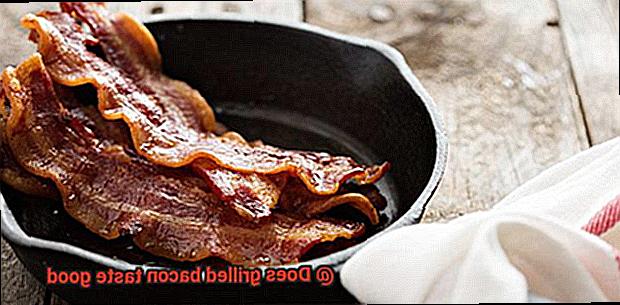
Grilling over an open flame can produce a smoky flavor that many people enjoy, while grilling on a flat-top griddle can result in an even crispier texture. Whether someone prefers their grilled bacon chewy or crunchy is also a matter of personal taste.
Another benefit of grilling bacon is that excess fat drips away from the meat, resulting in a healthier dish. Additionally, grilling adds a unique smoky taste that cannot be achieved through other cooking methods.
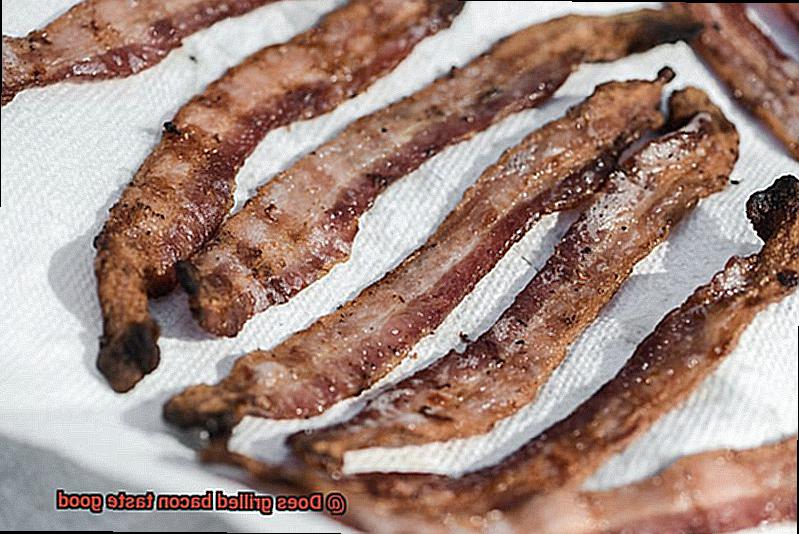
Grilled bacon can be enjoyed alone or as an ingredient in other dishes such as sandwiches, salads, or pasta dishes. Its distinctive flavor and texture make it a versatile ingredient that can elevate any meal.
Quality of the Bacon
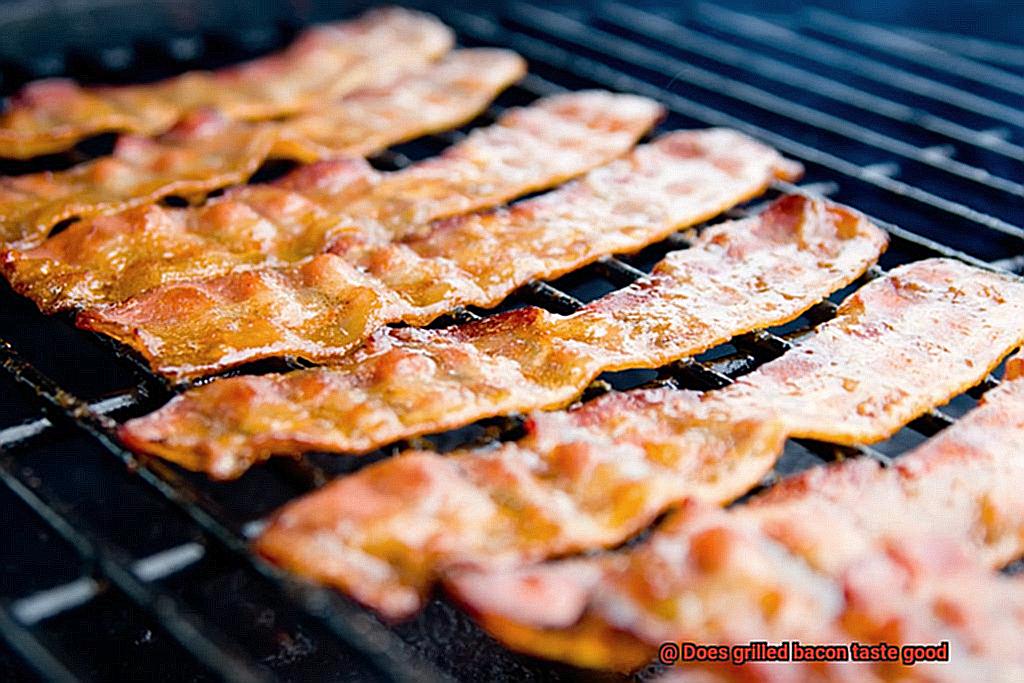
Let’s dive into the factors that determine the quality of grilled bacon.
Firstly, you need to consider the type and cut of bacon you’re using. Thick-cut bacon will be more chewy and substantial, while thin-cut bacon will be crispy and delicate. Each type of bacon also has its own distinct flavor profile, so it’s crucial to choose the right one for your preferences.
However, even if you’ve chosen the perfect type and cut of bacon, its quality is still paramount. High-quality bacon from reputable sources that are free from artificial preservatives and additives is a must for achieving a superior taste and texture.
Once you’ve got your hands on some top-notch bacon, it’s time to prepare it for grilling. Some people prefer to marinate their bacon in a blend of spices and seasonings for an extra kick of flavor. Others may opt for a simple salt and pepper seasoning. Whatever your choice, ensure that you’re giving your bacon the attention it deserves.
Finally, the grilling technique itself can make or break the quality of your grilled bacon. Grilling over high heat for a short time will result in crispy, caramelized bacon, while grilling over low heat for a longer time will produce more tender, juicy bacon. It’s all about finding that perfect balance between heat and time.
In summary, achieving top-quality grilled bacon requires careful consideration at every step of the process. To summarize:
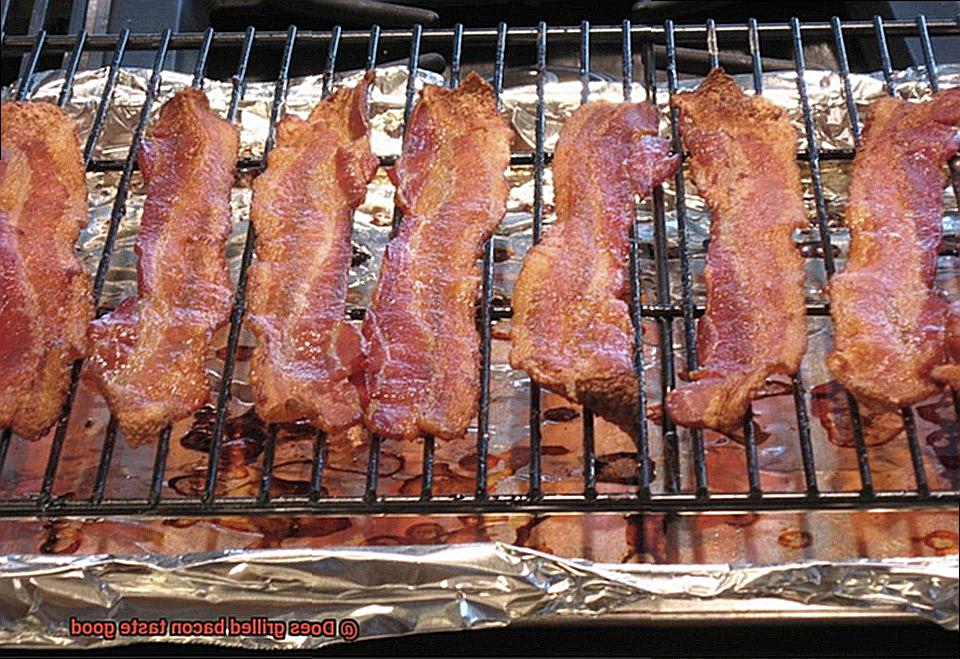
- Choose the right type and cut of bacon for your desired outcome
- Select high-quality bacon from reputable sources free from artificial preservatives and additives
- Prepare your bacon with care, whether you’re marinating it or simply seasoning with salt and pepper
- Master the art of grilling by finding the perfect balance between heat and time

Grilling Method
Grilling bacon is the perfect solution. Not only does it add a smoky flavor, but it also provides that satisfying crispy texture. But with different grilling methods available, how do you get the perfect grilled bacon?
The first step to achieving perfectly grilled bacon is to ensure that your grill is clean and well-oiled. This will prevent the bacon from sticking to the grates while ensuring even cooking. Once your grill is prepped, preheat it to medium-high heat. This step is crucial for achieving even cooking and crispy bacon.
Now, let’s dive into the different methods for grilling bacon. The most common method involves placing the bacon directly on the grill grates. However, this can lead to uneven cooking and flare-ups from the bacon grease. To avoid this, consider using a grilling basket or foil packet to contain the bacon while it cooks. This not only prevents flare-ups but also allows for easy flipping of the bacon to achieve an evenly cooked result.
No matter which method you choose, keeping a close eye on your bacon is essential. Grilled bacon can quickly go from perfectly crispy to burnt if left unattended for too long. So make sure to monitor your bacon closely and adjust the heat as needed.
Taste Preference
When it comes to taste preference, there’s no one-size-fits-all answer. Some bacon enthusiasts swear by grilled bacon, while others may prefer it pan-fried or oven-baked. The truth is, taste preference for grilled bacon can vary greatly depending on a variety of factors.
One of the standout features of grilled bacon is its smoky flavor. This flavor can be a game-changer for some people, while others might not appreciate it as much. It all comes down to personal taste and what you’re accustomed to. If you’ve never tried grilled bacon before, it’s definitely worth giving it a shot and seeing if it’s up your alley.
However, how you prepare your grilled bacon can make all the difference when it comes to taste preference. Overcooking the bacon can lead to a dry and tough texture that might not be appealing to some people, while undercooking it can result in a chewy and rubbery texture that could put off even the most hardcore bacon lovers. So, timing is everything when it comes to grilling bacon.
In addition to cooking methods, personal preferences can also impact whether or not someone enjoys grilled bacon. For instance, if you prefer your food less salty, you might not be as keen on grilled bacon since it tends to have a saltier taste. On the other hand, if you’re all about that savory kick, then grilled bacon might just be your go-to.
Of course, dietary restrictions are another factor to consider when it comes to taste preference. Vegetarians and vegans likely won’t find the taste of grilled bacon appealing due to their dietary preferences. But fear not. There are plenty of vegetarian and vegan bacon alternatives out there that can satisfy those cravings without compromising your dietary choices.
Different Types of Grilled Bacon
Bacon is a breakfast staple that has the power to make or break your morning meal. Grilling bacon can take it to the next level, providing a unique smoky flavor and crispy texture. However, not all bacons are created equal when it comes to grilling. Here are five different types of grilled bacon that can elevate your breakfast experience:
- Thick Cut Bacon: Thick cut bacon is perfect for grilling as it can withstand high heat without drying out. Its meatier flavor is enhanced by the grill, and its charred edges give it a satisfying crunch.
- Applewood Smoked Bacon: Applewood smoked bacon boasts a sweet, smoky flavor that complements the charred taste from the grill. But beware, its high sugar content can cause it to burn quickly, so keep a watchful eye while grilling.
- Peppered Bacon: For those who crave a bit of spice, grilling peppered bacon is the way to go. Its zesty flavor pairs well with the smoky taste from the grill, adding an extra layer of deliciousness to your breakfast.
- Maple Bacon: Maple bacon’s sweet and savory taste caramelizes beautifully on the grill. Its natural sweetness is brought out during grilling, creating an irresistible combination of flavors.
- Turkey Bacon: For a healthier alternative, try grilling some turkey bacon. Although it lacks traditional pork bacon’s fatty flavor, its similar texture can still satisfy your bacon cravings.
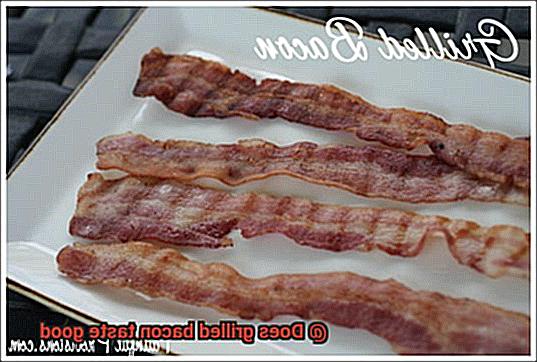
No matter which type of bacon you choose for grilling, ensure that you keep an eye on it while cooking. Adjust the temperature as needed to prevent burning or drying out. With the right technique and type of bacon, grilled bacon can undoubtedly be a mouth-watering addition to your breakfast spread.
Pork belly bacon is the most commonly used type of bacon for grilling. It has a rich, smoky flavor that is perfect for the grill and can be sliced thick or thin depending on your preference. For those who prefer a crispy texture, thinner slices of pork belly bacon are recommended.
Canadian bacon, also known as back bacon, is a leaner option compared to pork belly bacon. It’s cut from the loin of the pig and has a sweeter and milder taste than pork belly bacon. Canadian bacon is ideal for those who prefer a meatier texture and a less fatty taste.
Turkey bacon is another option for those who want to grill bacon but prefer a healthier alternative. It’s made from ground turkey meat and has a similar texture to pork belly bacon, but with a milder flavor than traditional pork bacon.
Regardless of the type of bacon you use, grilling can enhance its flavors and texture. The heat renders out the fat, creating a crispy texture and smoky taste. However, it’s essential to keep an eye on the grill while cooking bacon as it can quickly burn due to its high fat content.
The Best Way to Grill Bacon
Look no further than grilled bacon. However, grilling bacon requires a bit of finesse to achieve that perfectly crispy, smoky flavor. As an expert in all things bacon, let me guide you through the best way to grill bacon.
First and foremost, let’s talk about the type of bacon you should use. Thick-cut bacon is the ideal choice for grilling as it holds up better and doesn’t shrink as much as thin cuts. This means less likelihood of burnt or overly crispy bacon.
Next up, temperature is crucial. Preheat your grill to medium-high heat, around 375-400 degrees Fahrenheit. This ensures even cooking and prevents burning. Trust us, nothing ruins breakfast faster than burnt bacon.
To make grilling bacon a breeze, we recommend using a foil-lined baking sheet or cast-iron skillet. This not only prevents flare-ups but also makes clean-up a piece of cake. Simply place your bacon on the sheet or skillet, close the lid of the grill, and cook for about 5-7 minutes per side until it reaches your desired level of crispiness.
But here’s the catch – keep a close eye on your bacon while grilling. It can cook quickly and go from perfectly crispy to burnt in mere seconds. Use tongs to flip the bacon and move it around on the grill as needed.
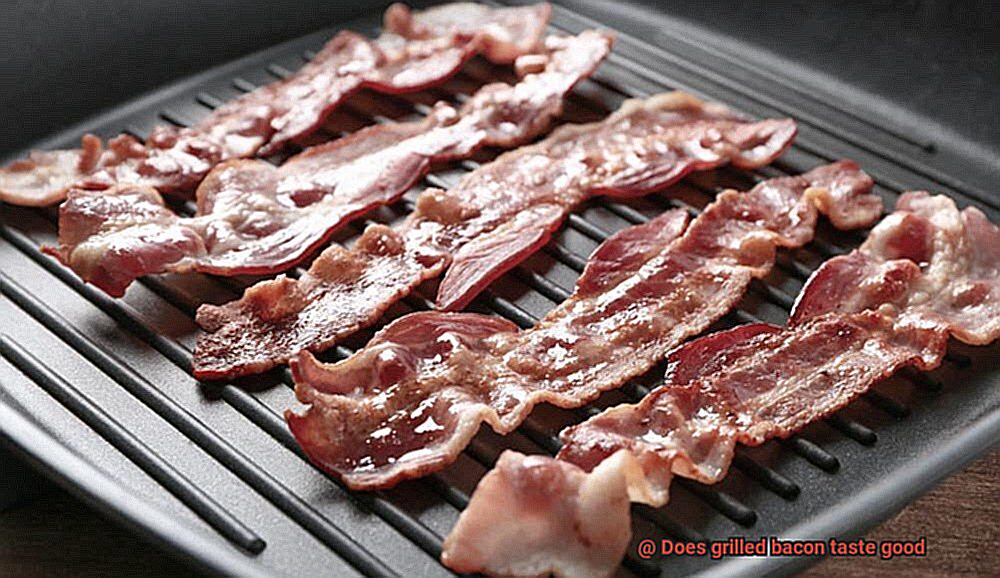
Pros and Cons of Grilled Bacon
As an expert on the topic, I can tell you that there are both pros and cons to grilling bacon, so let’s explore them in more detail.
Pros
Unbeatable Flavor: Grilling imparts a smoky flavor to the bacon that cannot be achieved through other cooking methods. The high heat of the grill also helps to caramelize the fat on the bacon, creating a crispy texture that many people love.
Healthier Option: Compared to pan-frying, grilling bacon is a healthier cooking method. The excess fat drips away from the bacon, resulting in a leaner and healthier end product.
Cons
Difficult to Cook Evenly: One potential downside of grilling bacon is that it can be challenging to cook evenly on the grill. Bacon has a tendency to curl up as it cooks, which can make it difficult to ensure that each strip is cooked evenly.
Burnt or Overcooked Bacon: If you’re not careful, the high heat of the grill can cause the bacon to become burnt or overcooked, which can ruin the taste and texture.
Messy: Grilling bacon can be messy as the fat drips down onto the grill grates, leading to splatter and smoke. If you’re grilling indoors, this could potentially set off your smoke detector or leave your kitchen smelling like smoke.
Health Benefits of Grilled Bacon
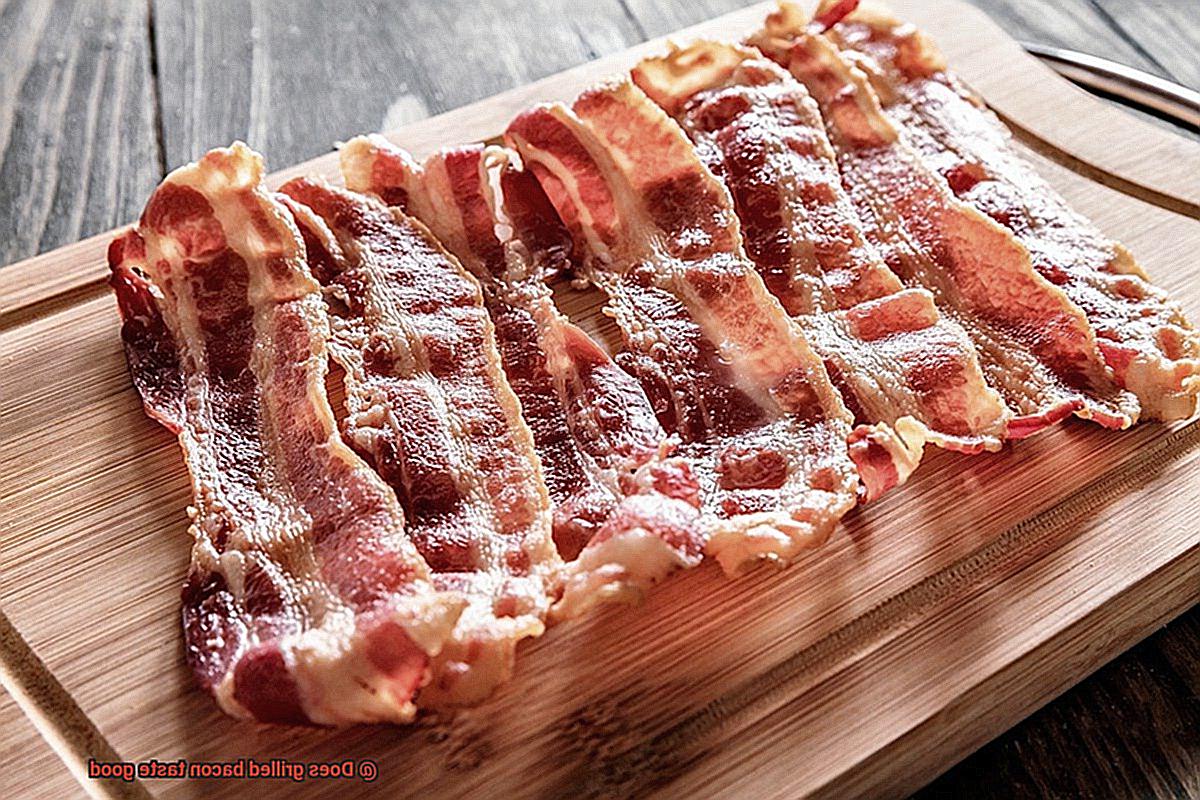
While it’s true that bacon is often seen as a guilty pleasure, it can actually be a part of a healthy diet when consumed in moderation.
One of the most significant health benefits of grilled bacon is its high protein content. Protein is essential for building and repairing muscle tissue, and it also helps maintain healthy hair, skin, and nails. A single slice of grilled bacon contains approximately 3 grams of protein, which can help you feel full and satisfied for longer periods.
Grilled bacon is also an excellent source of vitamin B12, which plays a crucial role in maintaining a healthy nervous system and producing red blood cells. Since vitamin B12 is mainly found in animal products such as meat, fish, and dairy, incorporating grilled bacon into your diet can help ensure you’re getting enough of this vital nutrient.
Contrary to popular belief, grilled bacon can be part of a healthy diet despite its reputation as a high-fat food. While it’s true that bacon contains saturated fat linked to heart disease when consumed in excess, it also contains “healthy” fats such as monounsaturated and polyunsaturated fats that can lower cholesterol levels and reduce the risk of heart disease.
However, not all bacon is created equal. When selecting your bacon to grill, opt for high-quality cuts that have undergone minimal processing and are free from added hormones and antibiotics. Additionally, make sure to cook your bacon to an internal temperature of at least 145°F to avoid any risk of foodborne illness.
In conclusion, grilled bacon may not be the healthiest food in the world, but it does have its benefits when consumed in moderation. So go ahead and indulge in that delicious crispy bacon. Just remember to balance it out with plenty of fruits, vegetables, and other healthy foods. In summary, the health benefits of grilled bacon include:
dGixcqWD7Qk” >
Conclusion
In summary, the debate over whether grilled bacon tastes good has been put to rest. Grilled bacon is a culinary masterpiece that tantalizes your senses with its heavenly aroma and unique smoky flavor. Its crispy texture adds an extra layer of indulgence to every bite.
To achieve the perfect grilled bacon, it’s important to pay attention to the details. Start by selecting high-quality bacon from reputable sources that are free from artificial preservatives and additives. Choosing the right type and cut of bacon is also crucial in achieving top-notch results.
Grilling bacon not only enhances its flavors but also has several health benefits. It’s a great source of protein and vitamin B12, while its “healthy” fats can help lower cholesterol levels and reduce the risk of heart disease when consumed in moderation.
Whether you’re a fan of thick-cut pork belly bacon or leaner turkey bacon, grilling can take your breakfast game to the next level. Just remember to keep a watchful eye on your bacon while cooking to avoid burning or drying out.
In conclusion, grilled bacon is a mouthwatering delicacy that should be savored by all. So why not fire up your grill and treat yourself to this irresistible breakfast staple?

